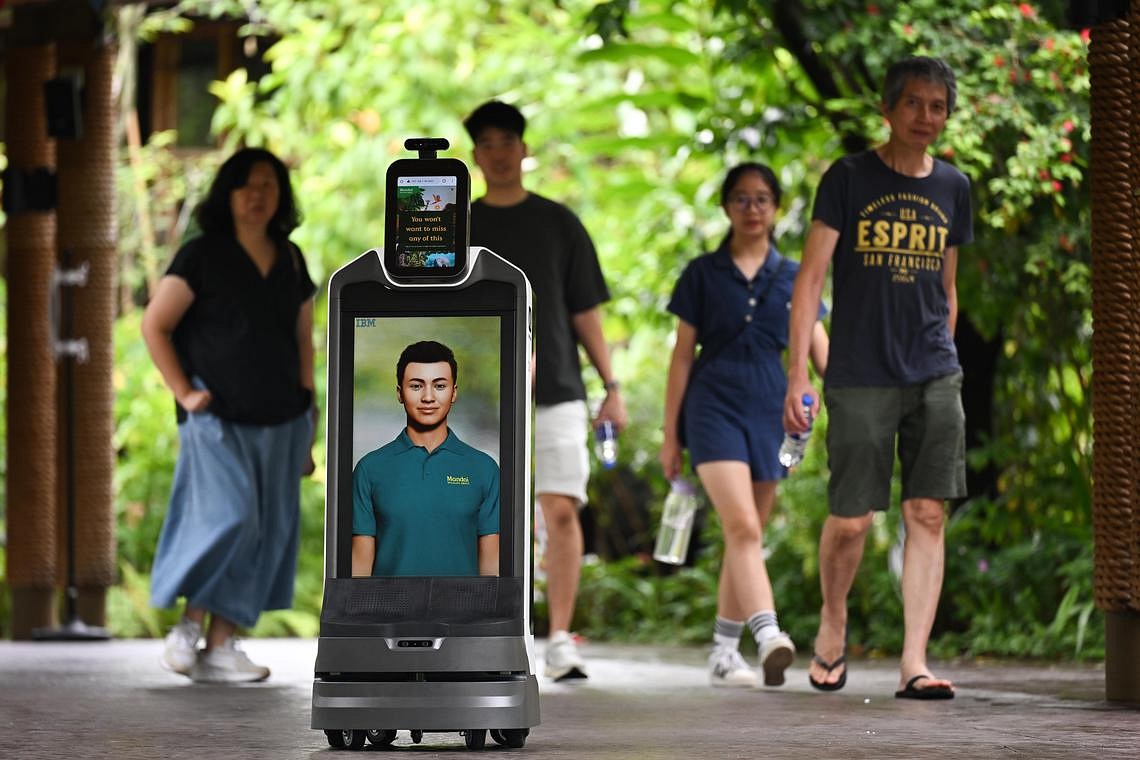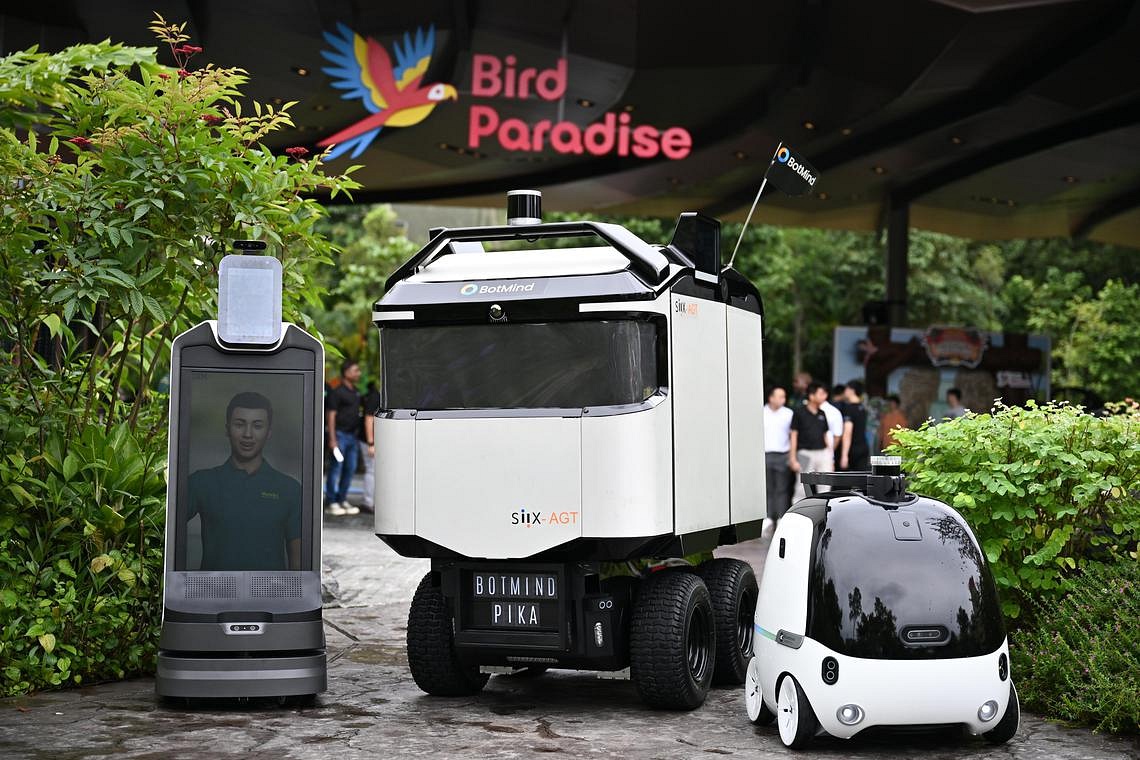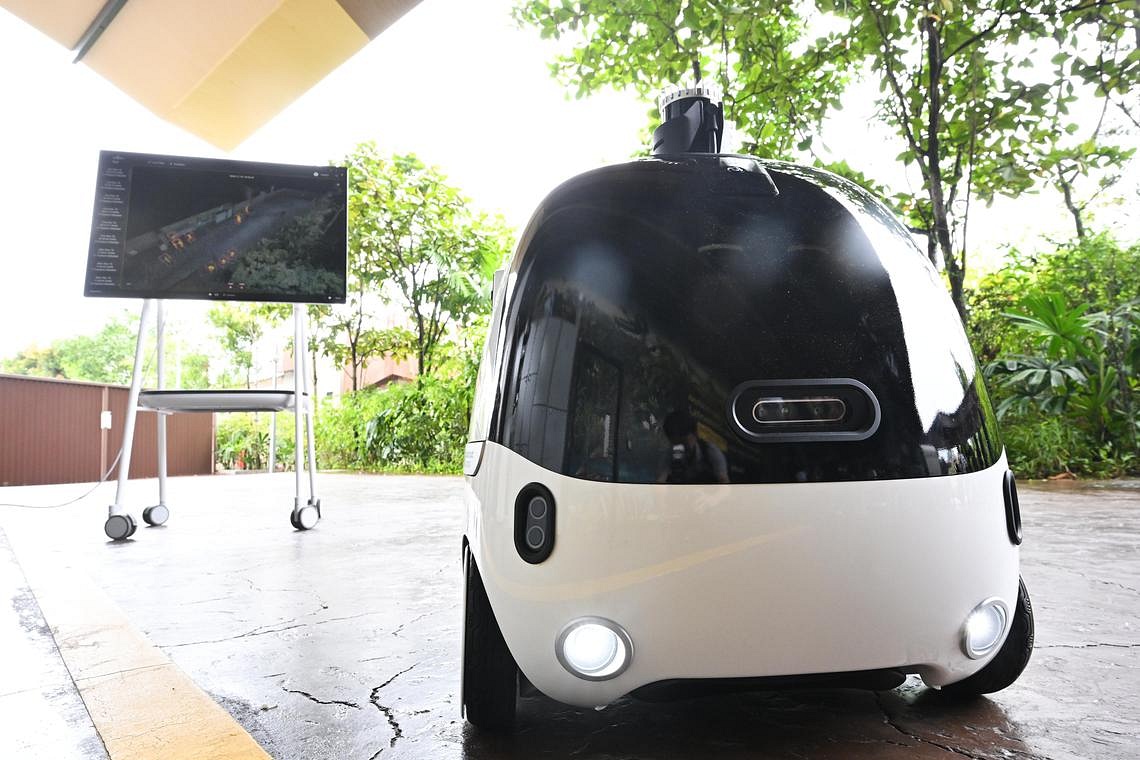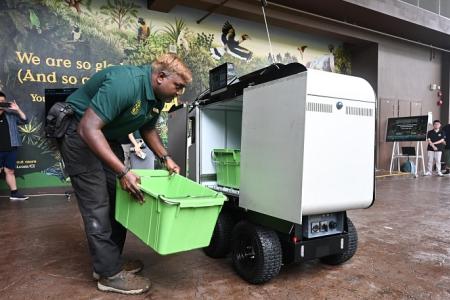Robot delivers meals on wheels for Bird Paradise residents
The winged residents at wildlife attraction Bird Paradise will have their own food delivery service – courtesy of a robot.
A self-driving, all-terrain vehicle that can traverse slopes and damp pathways within the park will be deployed to send food to designated points near the birds’ enclosures.
This delivery robot will be joined at Mandai Wildlife Reserve’s other parks by a surveillance bot, which conducts safety patrols and concierge bot, which will interact with visitors and provide park information.
The three robots were unveiled on Nov 19 at a media showcase.
They will be deployed as part of a trial at the bird park in the first quarter of 2025 in a collaboration between the Infocomm Media Development Authority (IMDA) and park operator Mandai Wildlife Group (MWG).
Bird Paradise, which opened in November 2023, is meticulously designed to replicate the birds’ natural habitats.
But delivering bird feed across the sprawling 17-ha site is time-consuming for park keepers, who typically send heavy batches of feed on a buggy. Using robots for the task is one way to ease the load of employees, allowing them to focus on assisting guests and looking after the birds, said MWG.
The six-month trial is being conducted to evaluate the feasibility of outdoor robots, IMDA and MWG said in a statement. Insights from the trial will help improve the technology and pave the way for large-scale adoption of the bots across various industries, they said.
The delivery bot designed by Botmind, for instance, is unlike most autonomous mobile robots in the market that are designed for smooth and dry surfaces.
The buggy-sized vehicle, named Pika, can carry loads of up to 250kg and is fitted with rugged wheels that allow it to scale slopes, as well as go over curbs and wet terrain.
Pika will travel up to several kilometres during each deployment from a centralised bird feed kitchen to the birds’ enclosures.
The use of a delivery bot such as Pika is expected free up some 1,200 manhours yearly, said MWG.

In early 2025, visitors to the wildlife reserve will also be greeted by an artificial intelligence (AI) concierge robot built by local tech company Autove Robotics. A female version of the concierge avatar – called Mandy, after Mandai – will be deployed in the coming months.
The robot, which displays a friendly-looking avatar on an in-built screen, can give visitors directions, prices and recommend activities. It can also physically lead visitors to locations in the park. During the trial, it will be stationed near the Singapore Zoo entrance.
Configured by US tech giant IBM based on its watsonx AI platform, the bot’s systems are designed to draw information only from Mandai Wildlife Reserve’s website and official resources to prevent errors.
The bot can also alert users to changes in the weather based on official weather forecast resources that it is linked with.

A surveillance robot called Dash-er will support security officers to monitor park grounds using a live camera feed, light detection and ranging (Lidar) sensors that are linked to a centralised command post.
Early in 2025, Dash-er will help conduct safety patrols along a 3.3km boardwalk around Singapore Zoo and River Wonders. It is expected to free up roughly half the workload for security personnel, said Mr Edmas Neo, vice-president of MWG’s Transformation Office.
All the robots are remotely monitored, managed and coordinated via a centralised control system.
The trials follows an agreement that IMDA and MWG signed in 2023 to test outdoor robotics at the part and other forms of technology, as part of a nationwide push to deploy robots in more sectors to curb manpower shortages and improve efficiency.
Ms Belina Lee, MWG’s deputy CEO of transformation and growth, said the group aims to turn the wildlife reserve into a smart precinct that uses technology to improve guest experience and animal care.

“The autonomous mobile robotics trial... seeks to demonstrate the potential of autonomous systems in dynamic environments... across multiple use cases,” said Ms Lee.
Some visitors got an early glimpse at the robots. Dr Annie Wong, a volunteer accompanying children to the park as part of a visit organised by a charity, asked the concierge bot for directions to the nearest washroom and food outlets.
The research scientist, 50, said: “The bot is easy to use and provides useful info to navigate around the park, although it’s a bit laggy.”
Get The New Paper on your phone with the free TNP app. Download from the Apple App Store or Google Play Store now

